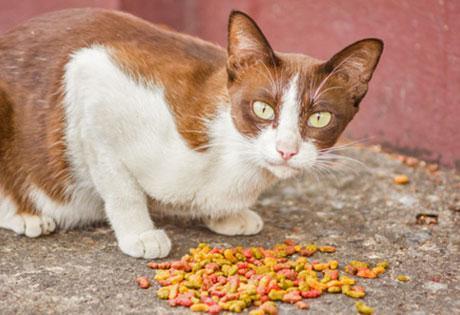This content is archived from the Feline Nutrition Foundation
Feline Nutrition: Who Bears the Responsibility?
- Updated: Sunday, February 24, 2019 05:04 PM
- Published: Tuesday, August 25, 2009 11:54 AM
- Written by Kymythy R. Schultze, CN
 At this point in my investigative journey to decide what to feed my cats, the commercial, processed pet-food products were definitely not coming up roses – or even catnip. But let me state for the record that I don't think the manufacturers are purposely trying to harm our cats. I don't think there's a cigar-smoking executive sitting behind his desk (in a corner office with a big window) doing a Snidely Whiplash impression while chanting: "I'm going to hurt some kitties today," followed by evil laughter, of course. No, it's not that personal – it's just business. It's like any other industry that makes billions of dollars every year: The bottom line is the top dollar.
At this point in my investigative journey to decide what to feed my cats, the commercial, processed pet-food products were definitely not coming up roses – or even catnip. But let me state for the record that I don't think the manufacturers are purposely trying to harm our cats. I don't think there's a cigar-smoking executive sitting behind his desk (in a corner office with a big window) doing a Snidely Whiplash impression while chanting: "I'm going to hurt some kitties today," followed by evil laughter, of course. No, it's not that personal – it's just business. It's like any other industry that makes billions of dollars every year: The bottom line is the top dollar.
I'm not faulting these companies for trying to make lots of money, but I don't have to approve of the way they do it. I'm certainly not a fan of animal testing, low-quality ingredients, components that aren't even appropriate for felines, too-frequent recalls, and questionable marketing tactics. But hey, when it comes down to it, my cat's health isn't really their responsibility.
Is my cat's health my veterinarian's responsibility? Not really. Yes, I go to vets for their professional opinions, which are very important to me. I respect their experience and education in most areas of animal health. But unless they've taken it upon themselves to study animal nutrition in an unbiased forum, they may not be the best source of advice for species-appropriate food for my cats. At veterinary schools, they receive very little education on this subject, and what they do get is mostly taught by employees of the larger pet-food companies. The little time devoted to nutrition usually involves the incomplete research we discussed earlier and heavy product pushing – not information about real food.
I have very dear friends who are veterinarians. Through their wisdom and my own experience and research, I've come to understand better why vets aren't always the best source of unbiased nutritional information. You see, when I was studying animal nutrition at Cornell University's College of Veterinary Medicine a few years ago, only a couple of my professors weren't paid employees of pet-food companies.
I'll never forget one particular lecture where the teacher/veterinarian was discussing the different forms of pet-food products – dry, canned, and so on. While she was talking about the semi-moist products, she mentioned in an offhand way that she would never feed them to her pets. Then she quickly laughed and said, "Oh, my boss would kill me if he heard me say that!"
I didn't find it amusing. It was painfully clear that she was repeating (except for her slip-up) what the pet-food company wanted the students to hear – not unbiased information or her actual opinion.
The biggest pet-food companies hire brilliant marketers to sell their products. After all, what could be better than having experts (veterinarians) endorse your product? How did this come about? Well, one of the parent companies that's become very involved with vets also makes toothpaste. Do you remember the old advertisement that boasted eight out of ten dentists recommend a particular brand? It was a brilliant campaign and put this firm at the top of toothpaste sales.
 At the time, the company also had a very small pet-food division they were about to sell, but an executive came forward with a great idea: If they could use the same tactic with this branch as they had with their toothpaste, they'd be equally successful. So they used the pharmaceutical industry's practice of spending tons of money to woo doctors. In fact, a retired sales executive from the pet-food company commented on why this marketing strategy works so well: "It's just like taking drugs: You go to the doctor, and he prescribes something for you, and you don't much question what the doctor says. It's the same with animals."
At the time, the company also had a very small pet-food division they were about to sell, but an executive came forward with a great idea: If they could use the same tactic with this branch as they had with their toothpaste, they'd be equally successful. So they used the pharmaceutical industry's practice of spending tons of money to woo doctors. In fact, a retired sales executive from the pet-food company commented on why this marketing strategy works so well: "It's just like taking drugs: You go to the doctor, and he prescribes something for you, and you don't much question what the doctor says. It's the same with animals."
They know that the trust cat guardians have in vets is so strong that they'll feed what they're told without question. So the manufacturer spends a great deal of money enforcing that connection. In fact, other than universities, this company is the country's largest employer of vets! They fund research and nutrition courses and professorships at veterinary colleges and offer a formal nutrition-certification program for technicians. They've also written a widely used textbook on animal nutrition that's given free of charge to veterinary students, who also receive stipends and get products at zero or almost-zero charge.
This relationship doesn't end after graduation. The corporation sends veterinarians to seminars on how to better sell their products, provides sales-goal-oriented promotions, gives them lots of promotional tools, and offers big discounts so that vets make more money on product sales.
There's really no point in naming names in this situation because these practices aren't confined to a single pet-food company. Although one or two used to have a corner on the veterinary market, others have now reaped the rewards of employing similar strategies. It's genius, really, and I can understand that many veterinarians have busy practices and may feel that they don't have time to investigate pet-foods more closely. It certainly must be easier and less time-consuming to simply suggest a familiar product and be done with it, but if they've got such an extremely close association with a pet-food company, we may reasonably assume that it might be difficult for them to offer an unbiased opinion on nutrition to their clients.
Additional Reading
Pet Food and Feeding: Personal Ruminations
A Veterinarian's View on Raw Cat Food: Andrea Tasi, VMD
Please understand that there are more and more vets today who are taking the time to learn about real-food nutrition. And with their busy schedules, I truly respect the ones who do; and I like to support these independent, open-minded individuals who enjoy continuing their education.
The bottom line is that my cat's health is my responsibility, and your cat's health is your responsibility. We choose which veterinarian to take our cats to. We choose to follow our vets' advice or not. We choose which type of food to feed our cats. All the choices are up to us, so choose wisely, grasshopper (my cats love to eat those guys)!
Kymythy R. Schultze has been a trailblazer in the field of animal nutrition for nearly two decades. She's a Clinical Nutritionist, a Certified Nutritional Consultant and one of the world's leading experts on nutrition and care for cats. Visit her atKymythy.com. "Responsibility" is chapter 8 of Kymythy's book Natural Nutrition for Cats, The Path to Purr-fect Health, and is posted here with her kind permission.




